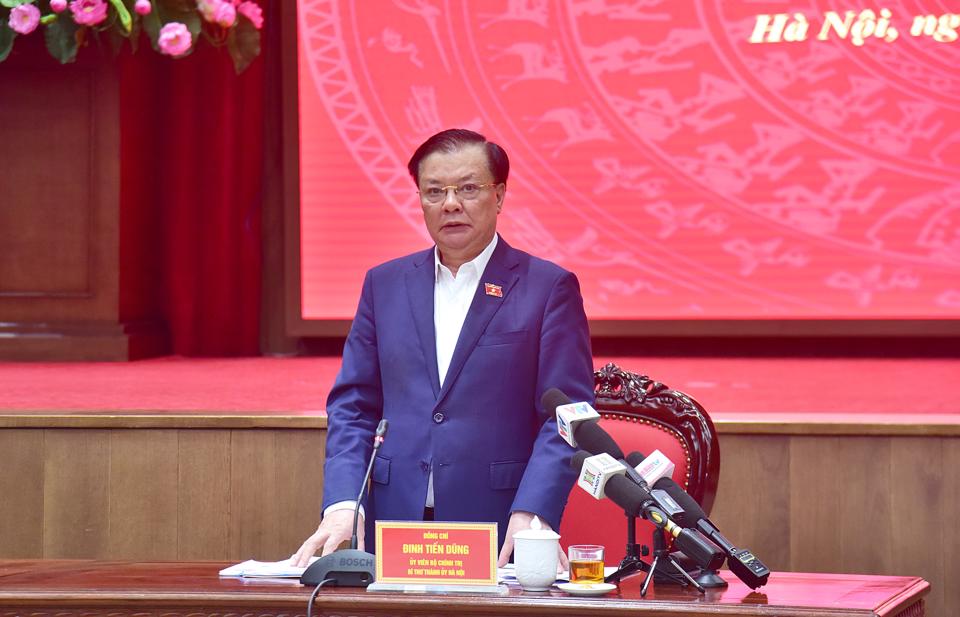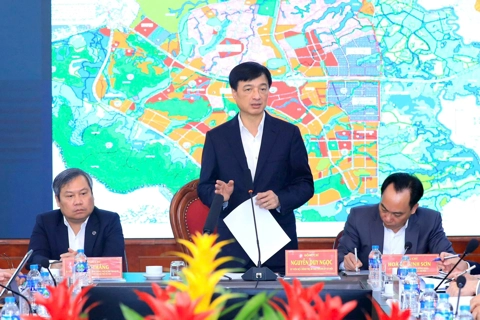Hanoi to submit amended Capital Law to parliament in May 2024
The upcoming Capital Law would help Hanoi address its shortcomings and current needs to ensure long-term growth in the next development phase.
Hanoi will work closely with relevant ministries and agencies to finalize the draft amended Capital Law, ensuring its quality and timely progress. The city aims to submit the revised Capital Law to the National Assembly for approval by May 2024.
| Overview of the meeting. Photos: Thanh Hai |
Tran Sy Thanh, Chairman of the Hanoi People's Committee, made the remarks at a meeting between the city's leaders and the Ministry of Justice on drafting the revised Capital Law.
During the conference, Thanh said the capital city has been implementing Resolution No. 15-NQ/TW, issued by Politburo on 5 May 2022, on the goals for Hanoi's development until 2030, in which amending the Capital City Law remains a crucial task.
In recent years, the Hanoi People's Committee has effectively cooperated with the Ministry of Justice to conduct research and prepare a dossier for drafting the amended Capital Law, he added.
Thanh noted that the city has reviewed the implementation of the 2012 Capital Law and submitted a dossier with nine policy groups covering various fields to the city's Party Committee for feedback.
"After receiving comments from the municipal party committee, the municipal People's Committee completed the dossier and submitted it to the Ministry of Justice in preparation for the next step of drafting the bill," he continued.
| Chairman of the Hanoi People's Committee Tran Sy Thanh. |
On December 30, the Ministry of Justice organized an evaluation council for the amended Capital Law to gather opinions on the draft law, followed by a government meeting on February 23 to approve the nine policy groups proposed in the amended Capital Law.
According to Thanh, Hanoi will maintain close coordination with the Ministry of Justice in the coming period to carry out the necessary activities according to the law-making process.
"The city has planned 14 major activities with specific timelines to ensure that the draft law is submitted to the National Assembly for consideration and approval at the 7th session in May 2024," Thanh said.
| Secretary of the Hanoi Party Committee Dinh Tien Dung. |
Secretary of the Hanoi Party Committee Dinh Tien Dung noted that the nine policy groups are based on the implementation review of the 2012 Capital Law and the city's urgent needs, such as the construction of large-scale social housing areas with adequate infrastructure, efficient land use, heritage protection, development of satellite towns, budget regulation, and handling violations of land use and construction regulations.
The Minister urged the Ministry of Justice to work closely with Hanoi with urgency and determination to complete the amended Capital Law on time and with high quality.
Echoing Dung's sentiments, Minister of Justice Le Thanh Long praised Hanoi's efforts in proposing amendments to the Capital Law.
| Minister of Justice Le Thanh Long. |
He also agreed with the proposed roadmap and suggestions put forward by the city and emphasized the Ministry's commitment to work closely with Hanoi to finalize the amended Capital Law and ensure that it contains practical and effective measures for the city's development.
Given the tight timeframe, the Minister recommended that the City develop a specific plan with clear roles, responsibilities, and deadlines for regular monitoring and follow-up.
He emphasized that the Ministry of Justice will closely monitor the progress of the project and assist Hanoi to ensure that the project meets the necessary quality standards and is completed on time.
Hanoi has put forward nine major policy directions for the revised Capital Law, including restructuring the local apparatus to improve efficiency, modernization, and professionalism; attracting high-quality workers to support Hanoi's development; strengthening Hanoi's financial and budgetary capacity for development purposes. Other proposals include developing urban, technical, and transport infrastructure; promoting modern agriculture and rural areas with civilized farmers; improving culture and education; unleashing the potential of science, technology, and innovation. The proposals also include developing a modern healthcare system and a comprehensive and inclusive social welfare system, while promoting connectivity within the Hanoi Capital Zone to make it one of Vietnam's major economic hubs with a fast, dynamic, and environmentally friendly economy. |







![[Infographic] Hanoi proposes policies for Capital Law amendments](https://cdn-media.hanoitimes.vn/2022/11/08/hanoi1.jpeg?w=480&h=320&q=100)








